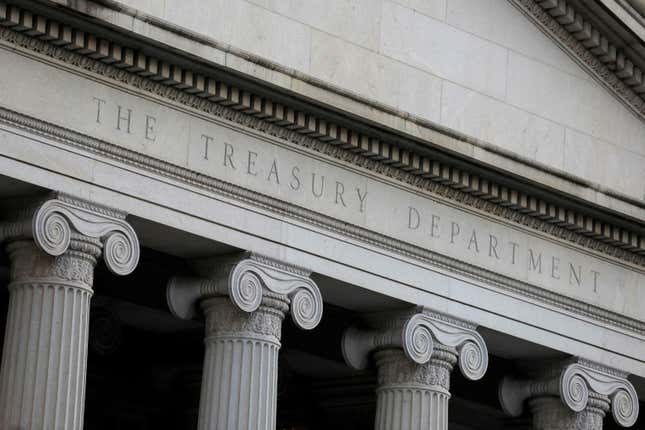
Even if the US stops paying interest on its debt due to a self-inflicted crisis, investors may keep buying it.
That’s because US Treasury notes, bills and bonds are still seen, counterintuitively, as likely to be paid back. Even during times of uncertainty, investors are confident in the US ability to make good on its debts. When people, countries, and companies with large amounts of money want to park their cash and stock markets are too volatile, they land on highly-rated debt.
And there’s no other source of debt capable of replacing Treasurys, says Josh Lipsky, senior director of the Atlantic Council’s GeoEconomics Center. You’d have to combine all of the debt of the G-7 countries and China to match the amount of US debt available for purchase. “You can’t just flood that market and say ‘we want to buy up all your debt,’ because the Germans don’t want to issue all that debt,” Lipsky told Quartz.
The point of comparing sovereign debt issued by the US and other countries is to prove that no other nation would benefit from an American default. They simply don’t have enough quality sovereign debt for investors to buy, Lipsky said.
What happens when the X-date arrives?
Even if the US defaults, credit rating agencies would likely downgrade the debt slowly, and most investors presume that the US would raise its debt ceiling in the near term, Lipsky added.
When Congress got stuck in political gridlock over the debt ceiling in 2011, Treasury prices actually rose as investors sought safe assets, even though US Standard & Poor’s downgraded the US credit rating from AAA to AA+ over concerns about a potential default. Fitch Ratings and Moody’s Investors Service kept the triple-A rating for US debt, but said the country was in danger of a possible downgrade.
Fitch’s global head of sovereign debt ratings, James McCormack, told CNN in March that the agency would consider a downgrade to US debt if global financial markets started to question the dollar’s role as the global reserve currency. But as Lipsky makes clear, it may be impossible for global investors to give up on US debt and the US dollar in the near term.
Default would still be a terrible, self-inflicted wound
It’s difficult to predict what will happen when the US runs out of cash on hand to pay its bills. It’s likely that the US would continue to pay its debts to other countries, and default on obligations to its citizens, so that the global financial system would continue functioning, Lipsky said.
In a scenario where the US keeps paying the coupon on its debt and cuts other spending, global investors would still flock to US Treasurys, but the most vulnerable Americans would no longer receive government support. Veterans, the elderly, and the disabled could all lose benefits, and the US would likely enter a recession, according to White House forecasts.
This depends on how long negotiations continue while the US is in breach of the debt limit. If the gridlock in Washington drags on, then there is potential for even greater economic damage, such as a global recession.
“The takeaway people should have from this chart is that we have an extraordinary privilege in the United States of being the issuer of so much of what the world wants—this safe asset,” Lipsky said. “So to flirt with disaster and damaging that [reputation] is just a terrible decision.”